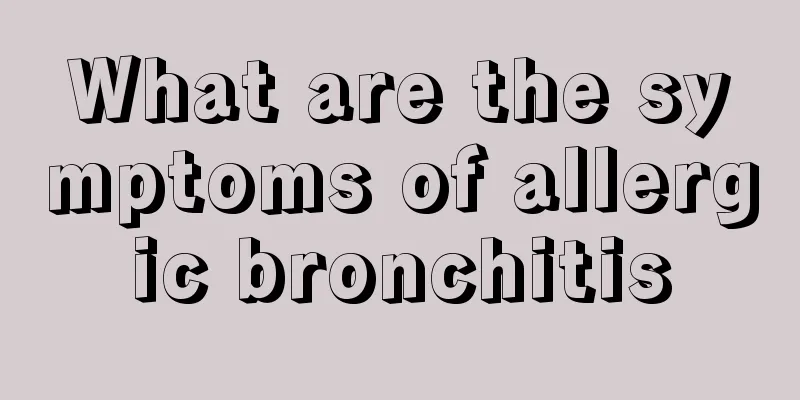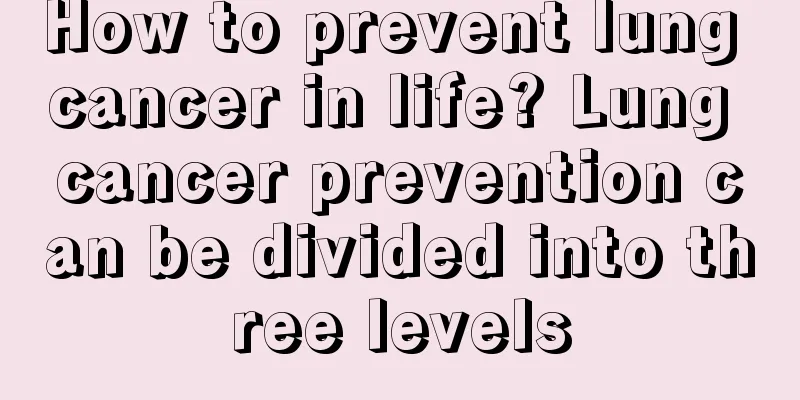What are the symptoms of allergic bronchitis

|
Today's ecological environment is getting worse and worse. Affected by the air quality, the incidence of allergic bronchitis clinically shows an upward trend. If the treatment effect can be achieved in the early stage of allergic bronchitis, it will be relatively ideal. This is the best time for treatment. Let's take a look at the symptoms of allergic bronchitis. 1. When the condition is severe, the wheezing sound can be heard without a stethoscope. Coughing is a common symptom of asthma. It is a dry cough before an asthma attack. During an asthma attack, coughing and sputum production are reduced, and wheezing is the main symptom. When the coughing and wheezing are nearing the end, bronchial spasm and airway stenosis are relieved, and a large amount of respiratory secretions need to be discharged. Coughing or sputum production will worsen again. After coughing up a large amount of white foamy sputum, the asthma symptoms are relieved. Recurrent chronic cough may be the only clinical manifestation of the disease, especially in children. This chronic cough is worst at night, and during an asthma attack, the patient may experience chest tightness and tightness. As long as the patient has a typical history of recurrent asthma attacks, that is, the "four characteristics" of bronchial asthma, suddenness, recurrence, self-limiting, and reversibility, the diagnosis can be confirmed. The difficulty lies in finding out the cause of the patient's illness, what allergens are causing it, and carrying out targeted prevention and treatment to effectively control asthma. 2. Some patients with allergic bronchitis and asthma have clinical manifestations such as itchy nose, sneezing, watery nasal discharge, itchy eyes, tearing, dry cough, etc., followed by typical bronchospasm symptoms. Wheezing and dyspnea are characteristic clinical manifestations. 3. Recent studies have shown that allergic bronchial asthma is a chronic airway inflammatory disease induced by multiple factors. It is mainly a type I allergic reaction caused by allergens in the air or food. Therefore, bronchial asthma refers to allergic bronchial asthma. Viral respiratory infections or exercise can aggravate the condition. The disease mostly occurs in children and young adults. Most patients have attacks at night, with mild symptoms or no symptoms during the day. This often leads to misunderstandings of the patients by others and has a great impact on their work, study, and family life. Symptoms of allergic bronchial asthma: The above introduces related issues, hoping to provide some help for the treatment of patients with allergic bronchial asthma who are undergoing treatment. |
<<: Symptoms of allergic eczema
>>: What are the symptoms of kidney stones
Recommend
Can blood diseases be transmitted to others?
Blood diseases will not be transmitted to others....
How to fart after appendectomy surgery
Appendicitis is very common in clinical practice....
What are the effects of swallowing disorders
There are many diseases, big and small, in life t...
Education methods for five-year-old babies
A five-year-old baby is attending kindergarten. A...
Which sole material is better
Nowadays, when people buy shoes, they will choose...
How to squeeze out blackheads quickly
Blackheads are a relatively common skin problem, ...
What to do if hoarseness occurs in the early stage of laryngeal cancer
We all know the harm that laryngeal cancer brings...
Why are my hands and face numb?
Numbness in the hands and face is not a normal re...
Ring on right ring finger
Many people like to wear various kinds of decorat...
How to solve the astringency of mango
If the mango is astringent, it means that the man...
What causes dry mouth, bitter taste and bad breath?
In daily life, many friends often experience dry ...
How to detoxify your underarm lymph nodes?
With the improvement of people's health aware...
What should we pay attention to in preventing liver cancer? Which type of people are prone to liver cancer?
Many people have the habit of smoking and drinkin...
Is running in place an aerobic exercise?
Running is a form of exercise that everyone shoul...
Will there be abnormal liver function in the early stage of liver cancer?
Liver cancer may not directly cause abnormal live...









